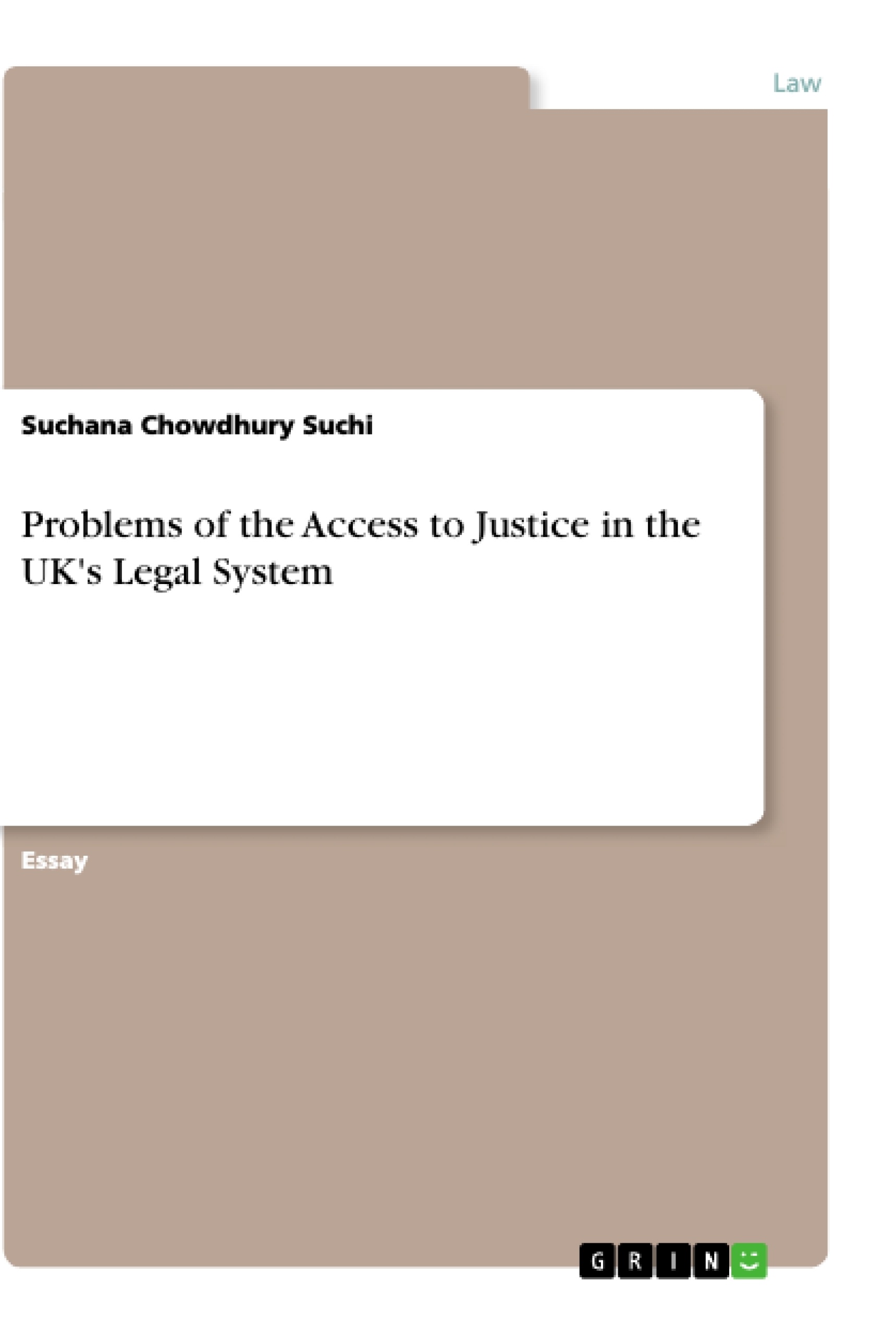The continuous reduction of legal aid funding has raised question whether the UK is denying its citizen’s access to justice and missing its rule of welfare state. It had been put into practice since the second half of the twentieth century, where the indigenous people, unable to afford the cost of access to justice, were granted legal aid funding with public money. Access to justice is no more prioritised like education, healthcare, and social security to utilise taxpayer’s money, while legal advice cost of barristers and solicitors has accelerated at a higher rate. Although equal opportunity and human rights are the two major focal points of English Legal System, austerity caused by economic downturn made it difficult to balance the spending of public money for common necessities of the society and curtailed legal aid. Thus, access to justice is far away from essential needs, and just a luxury for the poor people, which may bring lawlessness in the society.
Inhaltsverzeichnis (Table of Contents)
- In An Age Of Austerity, Access To Justice Is A Luxury
- The Continuous Reduction of Legal Aid Funding
- The Impact of Austerity on Access to Justice
- Legal Aid Sentencing and Punishment of Offenders Act 2012
- The Future of Legal Aid
Zielsetzung und Themenschwerpunkte (Objectives and Key Themes)
This monograph examines the impact of austerity measures on access to justice in the UK, focusing on the reduction of legal aid funding. It explores how these cuts affect various segments of society, including vulnerable groups and individuals with limited financial resources.
- The decline in legal aid funding and its implications for access to justice
- The role of the welfare state in providing legal aid
- The impact of austerity measures on vulnerable groups and individuals seeking justice
- The potential for social disparity and lawlessness as access to justice becomes increasingly limited
- The ethical and legal considerations surrounding the reduction of legal aid in the context of equal opportunity and human rights
Zusammenfassung der Kapitel (Chapter Summaries)
- In An Age Of Austerity, Access To Justice Is A Luxury: This chapter introduces the topic of austerity and its impact on access to justice in the UK, outlining the key concerns and controversies surrounding the reduction of legal aid funding. It highlights the arguments and protests of groups like UK Uncut, who advocate for the protection of legal aid to ensure justice for all.
- The Continuous Reduction of Legal Aid Funding: This chapter delves into the historical context of legal aid in the UK, tracing its development and highlighting the key factors contributing to the recent decline in funding. It examines the political and economic pressures that have led to austerity measures and their impact on the legal system.
- The Impact of Austerity on Access to Justice: This chapter explores the consequences of legal aid cuts for individuals and groups who rely on public funding to access legal services. It highlights the challenges faced by vulnerable populations, including the poor, disabled, and victims of domestic abuse, who may be disproportionately affected by the limitations imposed by austerity.
- Legal Aid Sentencing and Punishment of Offenders Act 2012: This chapter analyzes the specific legal framework and policies implemented under the Legal Aid, Sentencing and Punishment of Offenders Act 2012. It examines the details of the cuts to legal aid, the criteria for eligibility, and the potential repercussions for different categories of individuals seeking legal assistance.
- The Future of Legal Aid: This chapter explores the potential long-term implications of austerity measures on the legal system and access to justice. It discusses the ethical and legal dilemmas surrounding the balancing of public spending with the need to ensure fair and equal access to justice for all citizens.
Schlüsselwörter (Keywords)
This monograph focuses on the interplay of legal aid, access to justice, austerity measures, and the welfare state in the UK. It explores the impact of economic downturn on the provision of legal services, emphasizing the ethical concerns surrounding access to justice for vulnerable groups. The key terms and concepts include legal aid, access to justice, austerity, welfare state, human rights, equal opportunity, and the English legal system.
Frequently Asked Questions
How has austerity affected legal aid in the UK?
Austerity measures have led to significant funding cuts, making legal aid less accessible and effectively turning access to justice into a "luxury" for many citizens.
What is the Legal Aid Sentencing and Punishment of Offenders Act 2012?
Commonly known as LASPO, this act introduced deep cuts to legal aid funding in England and Wales, restricting eligibility for many types of civil and family law cases.
Which groups are most affected by legal aid cuts?
Vulnerable populations, including the poor, disabled individuals, and victims of domestic abuse, are disproportionately affected as they lack the means to pay for private legal advice.
What is the potential social impact of reduced access to justice?
Experts warn that limited access to justice can lead to social disparity, a sense of lawlessness, and a breakdown of the rule of law within the welfare state.
Is justice still a priority for UK taxpayer money?
The monograph suggests that under austerity, justice has been de-prioritized compared to healthcare and education, leading to a "justice gap" in society.
- Citar trabajo
- Suchana Chowdhury Suchi (Autor), 2014, Problems of the Access to Justice in the UK's Legal System, Múnich, GRIN Verlag, https://www.grin.com/document/915603



